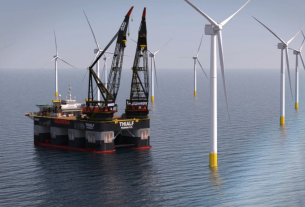United Kingdom – Since the publication of the Prime Minister’s Ten Point Plan, more than £5.8 billion in foreign investment in green projects has been secured, as have at least 56,000 employment in the UK’s clean industries.
This significant increase in green investment, highlighted in new data issued by the Department for International Trade, contributes to the Prime Minister’s aim to make the UK a global leader in green technology and finance. It includes over £650 million in offshore wind advancement this year alone, supporting around 3,600 employment throughout the Humber and North-East, and over £900 million in accelerating the transition to zero-emission vehicles.
Envision AESC, for example, will invest more than £400 million in battery manufacturing as part of a £1 billion initiative with Nissan and Sunderland Council to build a flagship Electric Vehicle Hub. ENI Spa has spent almost £400 million in offshore wind.
Since the Prime Minister’s Ten Point Plan was released, UK and international investment has backed the vision of a Green Industrial Revolution, with approximately 56,000 green jobs across the UK economy either already online or in the pipeline over the next decade – including in electric vehicle manufacturing in Sunderland, Hydrogen facilities in Teesside, and offshore wind in Northumberland, Yorkshire, and Humber.
The Global Investment Summit, which takes place next week in London, is expected to draw around 200 prominent industry professionals from across the world looking to invest in the finest of UK green business and innovation. Securing private investment in sustainable technologies is a critical component of the government’s plan to accomplish world-leading emissions reduction targets over the next decade and attain Net Zero by 2050.
The Prime Minister’s Ten Point Plan will mobilize £12 billion in government investment over the next decade to create and support up to 250,000 highly skilled green jobs in the UK – and will unlock three times that amount in private sector investment by 2030. The government’s Net Zero Strategy will build on previous efforts and chart a clear route to net zero emissions by 2050.
Further progress since the Ten Point Plan includes:
- Securing around £1.5bn of investment into offshore wind industry, supported by the government’s £160m scheme to upgrade ports and infrastructure. Renewables now represent almost 40% of the UK’s total electricity generation.
- Kicking off the biggest-ever round of flagship renewable energy scheme for low carbon electricity (Contract for Difference) with £200 million for offshore wind projects and £24m for floating offshore wind.
- Publishing the Hydrogen Strategy to grow the UK hydrogen economy, consulting on design of the £240m Net Zero Hydrogen Fund, and announcing funding of seven real-world hydrogen transport pilots.
- Committing £20 million to increase on-street charge points for electric vehicles and providing £50m to support charge point installations.
- Publishing Transport Decarbonization Plan and National Bus Strategy, as well as supporting Coventry to become UK’s first all-electric bus city and consulting on world-leading pledge to end the sale of all new, polluting road vehicles by 2040 and net zero aviation emissions by 2050. This is on top of more than 300 new walking and cycling schemes.
- Providing £1 billion to upgrade schools, hospitals, and council buildings with energy efficiency measures and committing £222 million to upgrade socially rented homes. Local Authorities through the Green Homes Grant scheme have also started installing upgrades to around 50,000 low-income households.
- Announcing £19.5 million of grant funding for UK projects developing novel carbon capture technology and kicked off the process to decide the first carbon capture cluster locations in the industrial heartlands.
- Launching the floods investment programme that is on track to better protect 336,000 properties.
- Awarding 90 projects under the second round of the Green Recovery Challenge Fund, totaling £80 million of investment, and launched several schemes under the Nature for Climate Fund to expand the pipeline of tree planting projects in England.
- Launching the £1 billion Net Zero Innovation Portfolio, providing funding for low-carbon technologies and systems across the areas of the 10 Point Plan.
- Publishing the recommendations of the Green Jobs Taskforce.
- Launching the North Sea Transition Deal and Industrial Decarbonization Strategy.




